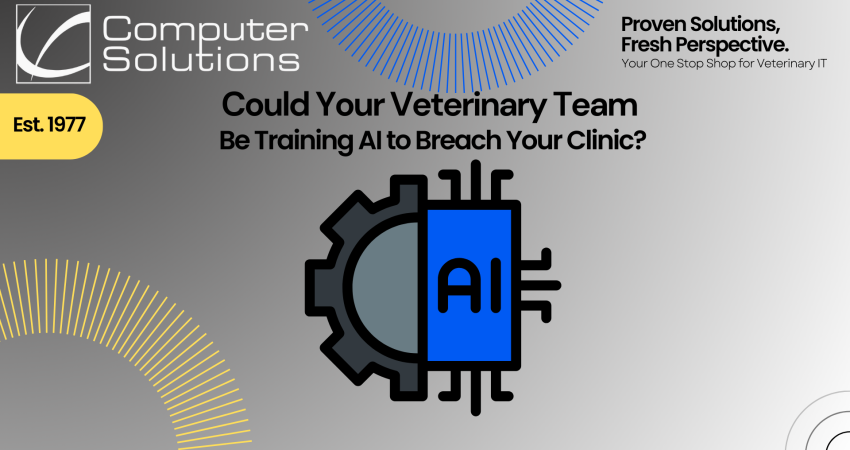
Posted by Computer Solutions on August 25, 2025
AI tools like ChatGPT, Microsoft Copilot, and Google Gemini are quickly becoming part of the daily workflow for many veterinary practices. Staff use them to write emails, summarize reports, respond to client inquiries, or even draft content for your website or social media.
Used properly, AI can save time and reduce administrative burdens. But used carelessly, it could quietly expose your clinic to serious AI cybersecurity risks. These include data leaks, compliance issues, and emerging threats most practice owners haven’t even heard of yet.
The Hidden Risk Behind AI Tools
The issue isn’t the AI platforms themselves. It’s what your team might be pasting into them.
Let’s say a team member pastes client payment details, lab results, or financial projections into ChatGPT to “help summarize” or “reword for an email.” In doing so, they may unknowingly upload protected or sensitive data to a public platform where it could be stored, shared, or used to train future models.
This isn’t just theoretical. In 2023, Samsung engineers accidentally leaked internal source code into ChatGPT, creating a major privacy concern. The result? A full ban on public AI tools across the company.
Now imagine that happening in your clinic—with pet owner records or internal communications.
Veterinary teams deal with more sensitive data than many realize. From payment and insurance info to lab reports, HR files, and practice management data, there’s a lot worth protecting.
A New Kind of Threat: Prompt Injection
AI isn’t just vulnerable to accidental misuse—it can also be exploited by attackers.
A technique called prompt injection hides malicious instructions inside emails, website text, PDFs, or even YouTube transcripts. When an AI model is asked to analyze or summarize that content, it can be manipulated into revealing data or bypassing controls.
Your front desk manager might use AI to summarize client survey responses or transcribe a recorded staff meeting—and unknowingly process something designed to exploit the tool.
This type of AI-assisted breach doesn’t require advanced hacking skills. It relies on the AI system to do the attacker’s work for them, and it’s one of the fastest-growing AI cybersecurity risks for businesses of all sizes.
Why Veterinary Clinics Are Especially Vulnerable
Most veterinary practices don’t have a written AI policy in place. Staff often adopt tools on their own, without IT oversight or a clear understanding of what’s safe to share.
Here’s what we commonly see:
- Staff using free public AI tools to draft client emails
- Personal devices accessing clinic data via AI apps
- No monitoring of what AI tools are being used
- No guidance on what data should never be shared
In an environment where client trust, medical records, and financial data are handled daily, this creates significant risk—especially for clinics that already rely on third-party tools, remote support, or cloud-based platforms.
4 Steps to Reduce AI Cybersecurity Risks at Your Clinic
You don’t have to ban AI altogether, but you do need to put the right safeguards in place.
1. Set a Clear AI Usage Policy
Document what tools are allowed, what types of data are off-limits (like client payment details or HR files), and who to contact with questions. Even a one-page policy can go a long way.
2. Educate Your Team
Hold a 15-minute lunch-and-learn to explain how AI tools work, what prompt injection is, and why certain data should never be pasted into chatbots.
3. Use Secure, Business-Grade AI Platforms
If your team wants to use AI, encourage them to use built-in tools within secure platforms like Microsoft Copilot. These offer better control over data privacy and compliance.
4. Monitor Usage on Work Devices
Restrict access to public AI platforms from clinic workstations, and track usage to make sure your team uses tools appropriately.
These steps may seem simple, but they’re your best defense against both accidental leaks and emerging AI-specific threats.
Why This Matters for Veterinary Teams
Veterinary clinics are fast-paced, client-focused, and increasingly digital. From mobile check-ins and cloud-based PIMS systems to online payments and third-party integrations, your practice is more connected than ever.
That’s why even small AI cybersecurity risks can have big consequences. A single copy-and-paste moment could expose your practice to a data breach, legal liability, or loss of client trust.
And as AI becomes more embedded in daily work, those risks will only increase.
Let’s Make Sure AI Is Helping—Not Hurting—Your Practice
At Computer Solutions, we help veterinary clinics across NJ, PA, and NY implement smart, secure systems that support growth without sacrificing data safety. That includes creating custom AI policies, locking down endpoints, and training your team to use these tools wisely.
Schedule a free consultation today here, and we’ll walk you through your current AI exposure—no jargon, no pressure.
Let’s make sure your clinic is using AI to get ahead—not accidentally training it to put you at risk.
Want to learn more about veterinary IT and cybersecurity? Check out another blog post here!
Discover more from Computer Solutions
Subscribe to get the latest posts sent to your email.







